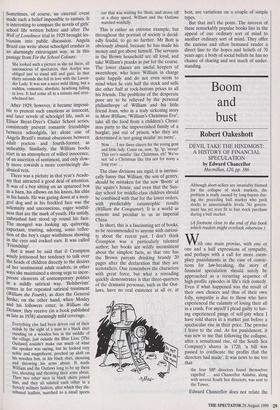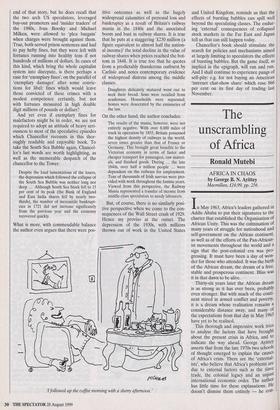Boom and bust
Robert Oakeshott
DEVIL TAKE THE HINDMOST: A HISTORY OF FINANCIAL SPECULATION by Edward Chancellor Macmillan, £20, pp. 386
Although short-sellers are invariably blamed for the collapse of stock markets, the problem is really caused by long-buyers dur- ing the preceding bull market who push stocks to unsustainable levels. No govern- ment has yet seen fit to ban stock purchase during a bull market.
(A footnote close to the end of this book which readers might overlook otherwise.) With one main proviso, with one or one and a half expressions of sympathy, and perhaps with a call for more exem- plary punishments in the case of convic- tions for law-breaking, the story of financial speculation should surely be approached as a recurring sequence of high-profile episodes in life's rich comedy. Even if what happened was the result of their own choices and thus of their own folly, sympathy is due to those who have experienced the calamity of losing their all in a crash. For myself I plead guilty to hav- ing experienced pangs of self-pity when I have sold shares in a market just before a spectacular rise in their price. The proviso I leave to the end. As for punishment, it was new to me that following the collapse, after a sensational rise, of the South Sea Company's shares in 1720, 'a bill was passed to confiscate the profits that the directors had made'. It was news to me too that
the four MP directors found themselves expelled ... and Chancellor Aislabie, along with several South Sea directors, was sent to the Tower.
Edward Chancellor does not relate the end of that story, but he does recall that the two arch US speculators, leveraged buy-out promoters and 'insider traders' of the 1980s, Ivan Boesky and Michael Milken, were allowed to 'plea bargain' when charges were brought against them. True, both served prison sentences and had to pay hefty fines, but they were left with fortunes running into healthy tens if not hundreds of millions of dollars. In cases of this kind, which bring the whole capitalist system into disrepute, is there perhaps a case for 'exemplary fines', on the parallel of `exemplary damages' after some convic- tions for libel: fines which would leave those convicted of these crimes with a modest competence certainly, but not with fortunes measured in high double digit millions of pounds or dollars?
And yet even if exemplary fines for malefactors might be in order, we are not required to adopt an attitude of heavy seri- ousness to most of the speculative episodes which Chancellor recounts in this thor- oughly readable and enjoyable book. To take the South Sea Bubble again, Chancel- lor's last words are worth highlighting, as well as the memorable despatch of the chancellor to the Tower:
Despite the loud lamentations of the losers, the depression which followed the collapse of the South Sea Bubble was neither long nor deep ... Although South Sea Stock fell to 15 per cent of its peak (the Bank of England and East India shares fell by nearly two- thirds), the number of mercantile bankrupt- cies in 1721 did not increase significantly from the previous year and the economy recovered quickly.
What is more, with commendable balance the author even argues that there were pos- itive outcomes as well as the hugely widespread calamities of personal loss and bankruptcy as a result of Britain's railway mania in the 1840s and the associated boom and bust in railway shares. It is true that he puts at a staggering 1.230 million (a figure equivalent to almost half the nation- al income)' the total decline in the value of railway shares when prices reached the bot- tom in 1848. It is true too that he quotes from a predictably thunderous outburst by Carlisle and notes contemporary evidence of widespread distress among the middle classes:
Daughters delicately matured went out to seek their bread. Sons were recalled from academies. Households were separated; homes were desecrated by the emissaries of the law.
On the other hand, the author concludes:
The results of the mania, however, were not entirely negative. With over 8,000 miles of track in operation by 1855, Britain possessed the highest density of railways in the world, seven times greater than that of France or Germany. This brought great benefits to the Victorian economy in terms of faster and cheaper transport for passengers, raw materi- als, and finished goods. During ... the late 1840s, over half a million people ... were dependent on the railways for employment. Tens of thousands of Irish navvies were pro- vided with work throughout the famine years. Viewed from this perspective, the Railway Mania represented a transfer of income from middle-class speculators to needy labourers.
But, of course, there is no similarly posi- tive perspective when we come to the con- sequences of the Wall Street crash of 1929. Hence my proviso at the outset. The depression of the 1930s, with millions thrown out of work in the United States followed up the coffee morning with a sherry afternoon.' and United Kingdom, reminds us that the effects of bursting bubbles can spill well beyond the speculating classes. The endur- ing 'external' consequences of collapsed stock markets in the Far East and Japan tell us that can still happen today.
Chancellor's book should stimulate the search for policies and mechanisms aimed at largely limiting to speculators the effects of bursting bubbles. But the game itself, as implied in the epigraph, will run and run. And I shall continue to experience pangs of self-pity: e.g. for not buying an American `internet chat-show share' which rose 866 per cent on its first day of trading last November.



























































 Previous page
Previous page